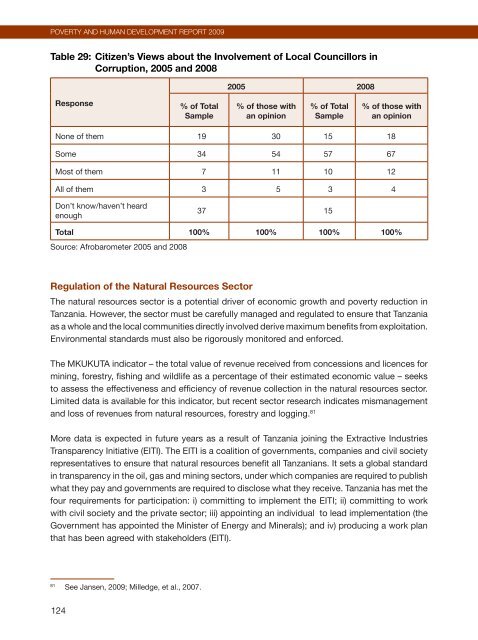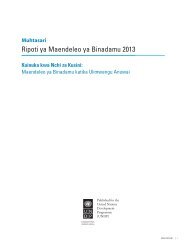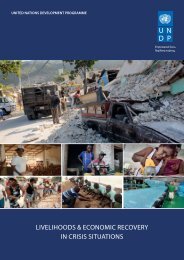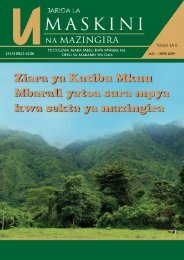Poverty and Human Development Report 2009 - UNDP in Tanzania
Poverty and Human Development Report 2009 - UNDP in Tanzania
Poverty and Human Development Report 2009 - UNDP in Tanzania
Create successful ePaper yourself
Turn your PDF publications into a flip-book with our unique Google optimized e-Paper software.
POVERTY AND HUMAN DEVELOPMENT REPORT <strong>2009</strong><br />
Table 29: Citizen’s Views about the Involvement of Local Councillors <strong>in</strong><br />
Corruption, 2005 <strong>and</strong> 2008<br />
Response<br />
% of Total<br />
Sample<br />
2005 2008<br />
% of those with<br />
an op<strong>in</strong>ion<br />
% of Total<br />
Sample<br />
% of those with<br />
an op<strong>in</strong>ion<br />
None of them 19 30 15 18<br />
Some 34 54 57 67<br />
Most of them 7 11 10 12<br />
All of them 3 5 3 4<br />
Don’t know/haven’t heard<br />
enough<br />
37 15<br />
Total 100% 100% 100% 100%<br />
Source: Afrobarometer 2005 <strong>and</strong> 2008<br />
Regulation of the Natural Resources Sector<br />
The natural resources sector is a potential driver of economic growth <strong>and</strong> poverty reduction <strong>in</strong><br />
<strong>Tanzania</strong>. However, the sector must be carefully managed <strong>and</strong> regulated to ensure that <strong>Tanzania</strong><br />
as a whole <strong>and</strong> the local communities directly <strong>in</strong>volved derive maximum benefits from exploitation.<br />
Environmental st<strong>and</strong>ards must also be rigorously monitored <strong>and</strong> enforced.<br />
The MKUKUTA <strong>in</strong>dicator – the total value of revenue received from concessions <strong>and</strong> licences for<br />
m<strong>in</strong><strong>in</strong>g, forestry, fish<strong>in</strong>g <strong>and</strong> wildlife as a percentage of their estimated economic value – seeks<br />
to assess the effectiveness <strong>and</strong> efficiency of revenue collection <strong>in</strong> the natural resources sector.<br />
Limited data is available for this <strong>in</strong>dicator, but recent sector research <strong>in</strong>dicates mismanagement<br />
<strong>and</strong> loss of revenues from natural resources, forestry <strong>and</strong> logg<strong>in</strong>g. 81<br />
More data is expected <strong>in</strong> future years as a result of <strong>Tanzania</strong> jo<strong>in</strong><strong>in</strong>g the Extractive Industries<br />
Transparency Initiative (EITI). The EITI is a coalition of governments, companies <strong>and</strong> civil society<br />
representatives to ensure that natural resources benefit all <strong>Tanzania</strong>ns. It sets a global st<strong>and</strong>ard<br />
<strong>in</strong> transparency <strong>in</strong> the oil, gas <strong>and</strong> m<strong>in</strong><strong>in</strong>g sectors, under which companies are required to publish<br />
what they pay <strong>and</strong> governments are required to disclose what they receive. <strong>Tanzania</strong> has met the<br />
four requirements for participation: i) committ<strong>in</strong>g to implement the EITI; ii) committ<strong>in</strong>g to work<br />
with civil society <strong>and</strong> the private sector; iii) appo<strong>in</strong>t<strong>in</strong>g an <strong>in</strong>dividual to lead implementation (the<br />
Government has appo<strong>in</strong>ted the M<strong>in</strong>ister of Energy <strong>and</strong> M<strong>in</strong>erals); <strong>and</strong> iv) produc<strong>in</strong>g a work plan<br />
that has been agreed with stakeholders (EITI).<br />
81 See Jansen, <strong>2009</strong>; Milledge, et al., 2007.<br />
124





